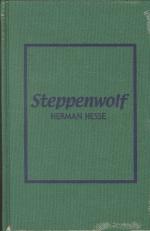|
This section contains 465 words (approx. 2 pages at 300 words per page) |

|
It would be helpful, in considering Steppenwolf, to review the characteristics of Surrealism (noting that the word derives from French and means "beyond Realism").
It is important to remember that it is different from Expressionism, which reveals no objective reality, whereas Surrealism distorts reality and often displays subconscious elements.
1. Are the surreal effects in this novel too extreme? Would the story work better if Hesse had subdued the Magic Theatre passages?
2. In a letter written to a reader in 1932, Herman Hesse said, "There is no form without faith, and there is no faith without previous despair, without previous (and also subsequent) acquaintance with chaos." Does this comment help to explain some of the thinking (and believing) behind the story of Steppenwolf?
3. In a foreword to the 1942 edition of the novel, Hesse explained that the suffering in the text leads "not . . . to death, not a decline, but...
|
This section contains 465 words (approx. 2 pages at 300 words per page) |

|




